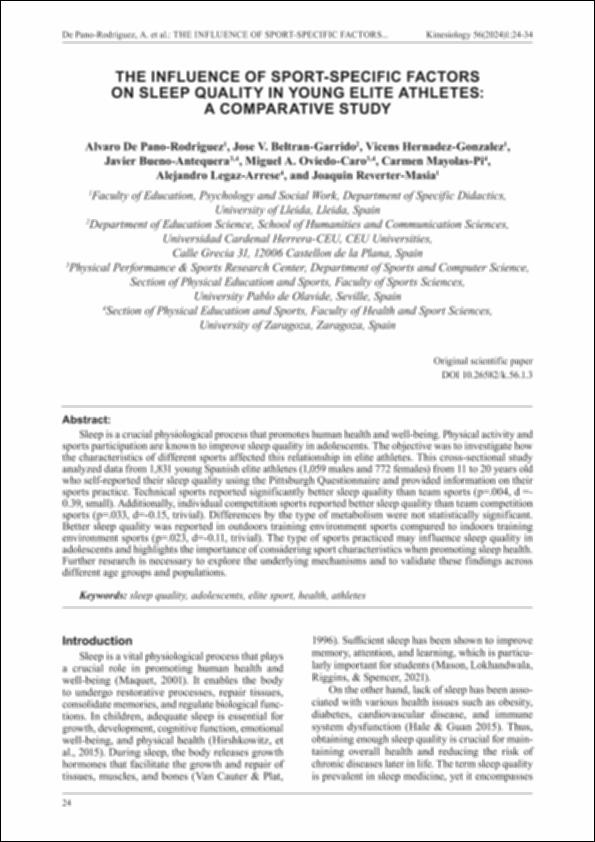Please use this identifier to cite or link to this item:
http://hdl.handle.net/10637/16045The influence of sport-specific factors on sleep quality in young elite athletes: a comparative study
| Title: | The influence of sport-specific factors on sleep quality in young elite athletes: a comparative study |
| Authors : | Pano Rodríguez, Álvaro de Beltrán Garrido, José Vicente Hernández González, Vicens Bueno Antequera, Javier Oviedo Caro, Miguel Ángel Mayolas Pi, Carmen Legaz Arrese, Alejandro Reverter Masia, Joaquín |
| Keywords: | Atleta; Athletes; Deporte; Sport; Joven; Youth; Sueño; Sleep; Calidad de vida; Quality of life; Salud; Health |
| Publisher: | University of Zagreb, Faculty of Kinesiology |
| Citation: | De Pano Rodríguez, Á., Beltrán-Garrido, J. V., Hernández-González, V., Bueno-Antequera, J., Oviedo-Caro, M.A., Mayolas-Pi, C., Legaz-Arrese, A. & Reverter-Masia, J. (2024). The influence of sport-specific factors on sleep quality in young elite athletes: a comparative study. Kinesiology: international journal of fundamental and applied kinesiology, vol. 56, i. 1 (07 jul.), pp. 24–34. DOI: https://doi.org/10.26582/k.56.1.3 |
| Abstract: | Sleep is a crucial physiological process that promotes human health and well-being. Physical activity and sports participation are known to improve sleep quality in adolescents. The objective was to investigate how the characteristics of different sports affected this relationship in elite athletes. This cross-sectional study analyzed data from 1,831 young Spanish elite athletes (1,059 males and 772 females) from 11 to 20 years old who self-reported their sleep quality using the Pittsburgh Questionnaire and provided information on their sports practice. Technical sports reported significantly better sleep quality than team sports (p=.004, d =- 0.39, small). Additionally, individual competition sports reported better sleep quality than team competition sports (p=.033, d=-0.15, trivial). Differences by the type of metabolism were not statistically significant. Better sleep quality was reported in outdoors training environment sports compared to indoors training environment sports (p=.023, d=-0.11, trivial). The type of sports practiced may influence sleep quality in adolescents and highlights the importance of considering sport characteristics when promoting sleep health. Further research is necessary to explore the underlying mechanisms and to validate these findings across different age groups and populations. |
| URI: | http://hdl.handle.net/10637/16045 |
| Rights : | http://creativecommons.org/licenses/by-nc/4.0/deed.es Open Access |
| ISSN: | 1331- 1441 1848-638X (Electrónico) |
| Issue Date: | 4-Jul-2024 |
| Center : | Universidad Cardenal Herrera-CEU |
| Appears in Collections: | Dpto. Ciencias de la Educación |
Items in DSpace are protected by copyright, with all rights reserved, unless otherwise indicated.


